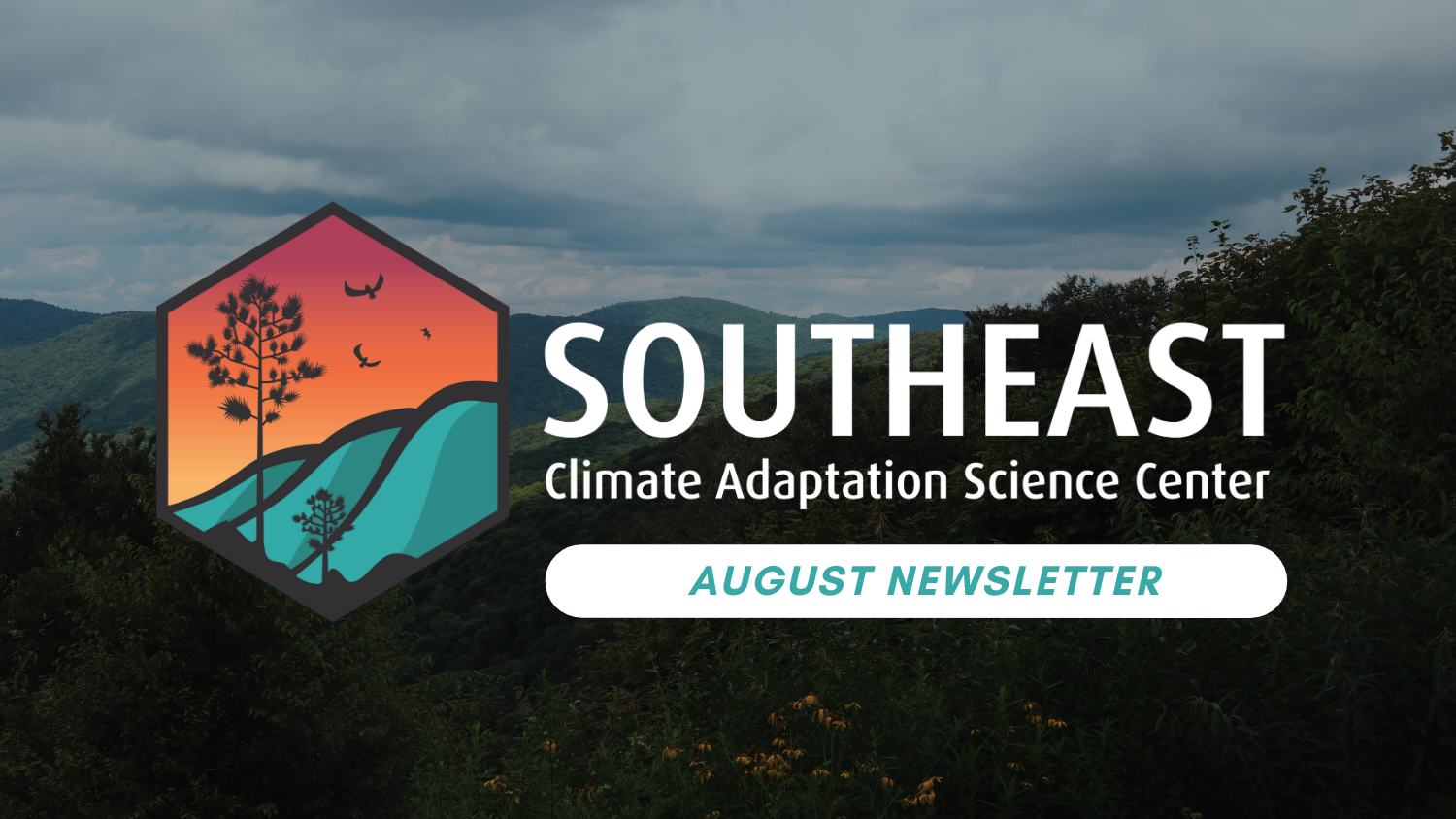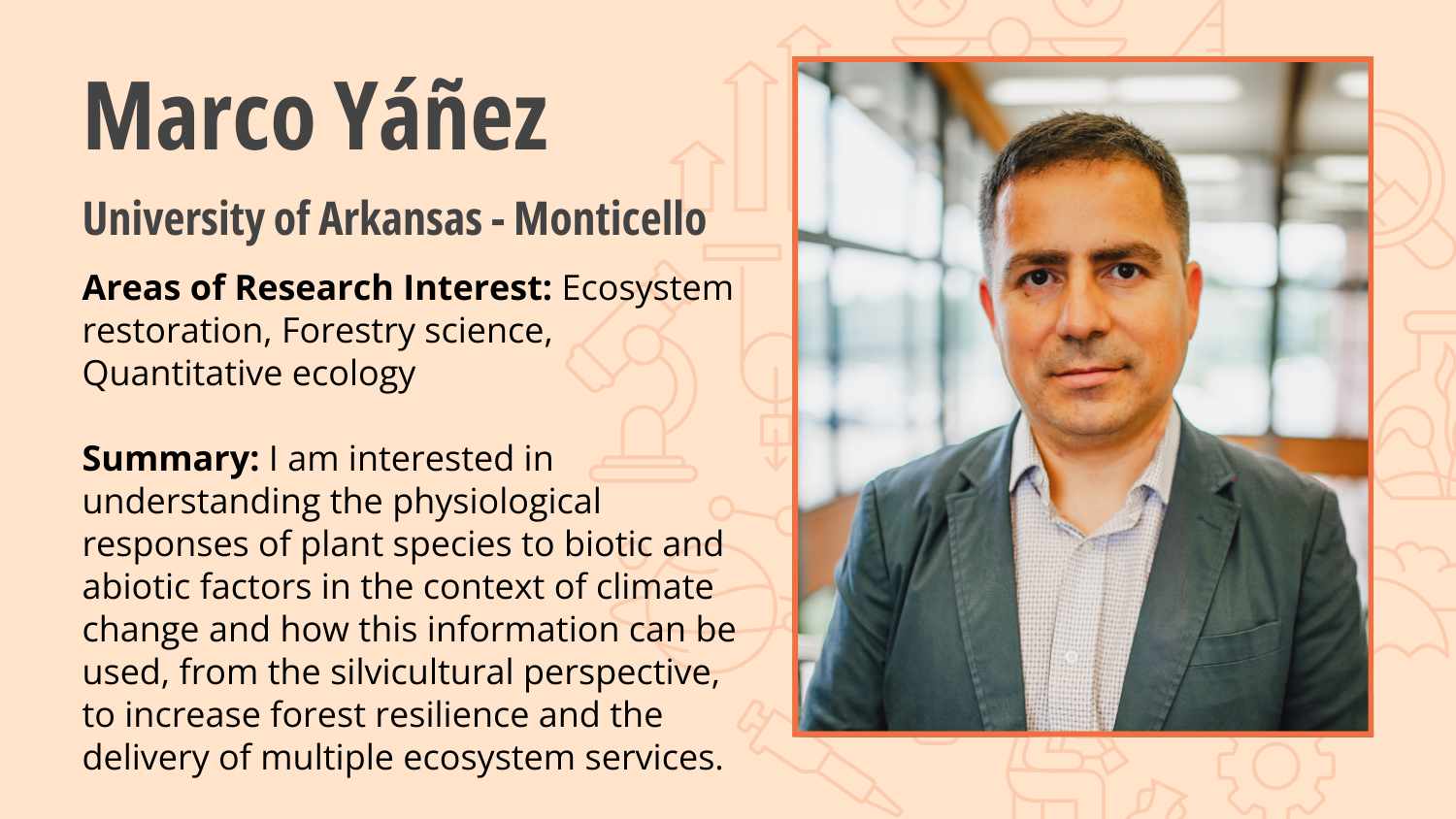August 2024 Newsletter

Get our newsletter in your inbox by subscribing here.
Southeast CASC News
Our summer science communications interns, Zavier Avery and Eleana Paneda, wrote their final pieces on the NC Co-op Unit and freshwater native fish in Puerto Rico. They reflected on the internship in these blog posts: Zavier’s summer reflections and Eleana’s Southeast Summer.
Register for the August Science Seminar on the exotic pet trade by Brett Scheffers happening Aug 28, 1PM ET.
The 2024-25 Global Change Research Fellows kicked off their year at the Climate Adaptation Retreat and Field Intensive.
2022-23 Global Change Research Fellow, Murry Burgess, talks about mentoring the next generation of conservation leaders.
We sat down with Consortium Director, Rebecca Irwin, to learn about the traits of a successful Fellow.
Newsletter readers, we want to hear from you! Please take a few moments to fill in our anonymous newsletter evaluation, and help us improve our communications with you.
Katie Warnell and Lydia Olander have released a new report evaluating the effectiveness of Nature-Based Solutions.
A new paper co-authored by Paul Armsworth on optimal conservation outcomes is out in Biological Conservation.
Roland Kays is the lead author on a new paper that finds that climate is still the most influential factor in determining where mammals can thrive.
Hamdi Zurqani has developed the first high-resolution forest canopy cover dataset for the entire state of Arkansas.
Research Affiliate Spotlight

View a searchable list of all SE CASC Research Affiliates and find your next collaborator!
Community News from the Southeast
Partners
Conservation Corridor writes about identifying stepping stones to increase connectivity.
The University of Arkansas at Monticello is set to break ground on the Arkansas Forest Health Research Center.
Tribal
Visit USET Climate Change Headlines for updates and highlights from across the USET region.
In June we joined five USET member Tribal Nations, and NE CASC at the 2024 Tribal Climate Resilience Camp, read all about it here.
Florence Indian Mound Museum in Alabama is hosting a Young Learners Series which will feature a practice that relates to Native American culture every month.
VisitCherokee.com wins a prestigious award in website redesign from the Association of Marketing and Communication Professionals.
NOAA Fisheries announced that the Alabama shad is one step closer to endangered species protection.
PBS reports on one of the oldest games in North America, stickball.
Duke is offering a new Cherokee language course this fall.
Gatherings
Webinars
- Aug 22 | 1PM | NIDIS FY25 Coping with Drought Competition Informational Webinar
- Sept 17 | 1PM ET | SE CASC Science Seminar: New Project Lightning Talks
- Sept 26 | 10AM ET | Science Seminar: Partnering with Fire – Learning from Tribal Nations and Indigenous Practices
Events
- Sept 9-12 | ITEP National Tribal and Indigenous Climate Conference | Anchorage, AK
- Sept 10-12 | NAFWS Northeast & Southeast Regional Conference | Warsaw, VA
- Sept 19-20 | KIETS Fall Symposium | Raleigh, NC
- Sept 22-25 | AFWA Annual Meeting | Madison, WI
- Oct 7-9 | 2024 USET/USET SPF Annual Meeting | Sovereign territory of the Seminole Tribe of Florida
Find more events on our calendar.
Resources and Publications
Resources
- NOAA Historical Hurricane Tracks. This is an interactive mapping tool to view, analyze, and share historical hurricane tracking information.
- The Aspen Institute Tactics for Trust. This resource offers a practitioner’s playbook for building public trust in science and other domains.
Publications
Improving ecosystem health in highly altered river basins: a generalized framework and its application to the Mississippi-Atchafalaya River Basin. Frontiers in Environmental Science.
The perceived “success” of public investment in declining ecosystems hugely influences future investment, but there is often a mismatch between what the public and the scientific community deem a success. This paper proposes a framework to improve ecosystem health in highly altered river basins. This framework includes indicators that allow stakeholders to better assess the effectiveness of management actions. They applied this framework in the Mississippi-Atchafalaya River Basin and suggest that it will be valuable in an array of altered river basins.
On the cost-effectiveness of Nature-based Solutions for reducing disaster risk. Science of the Total Environment.
This paper finds that Nature-Based Solutions (NBS) are a cost-effective approach to mitigating hazards and are no less effective than engineering-based solutions in mitigating hazards. They also found that NBS were most effective in mitigating hazards associated with mangroves, forests, and coastal ecosystems.
Identifying new invasive plants in the face of climate change: a focus on sleeper species. Biological Invasions.
Populations of introduced species that aren’t invasive but have the potential to be are referred to as sleeper populations. They are currently limited by various factors, but they may not be in the future as climate change alters those limiting conditions. This paper examined sleeper plant species in the northeastern US and quantified their negative ecological and socioeconomic impacts to determine the highest priority for management. This approach could inform proactive management strategies of sleeper species before they become invasive.
Opportunities
Student Announcements
NOAA has various opportunities for students in undergraduate and graduate programs.
NSF has several Graduate Research Fellowships for various areas of focus. Applications due throughout October.
University of California Davis is seeking a post-doc to develop and implement climate adaptation actions within Pacific-region parks. For more information, reach out to Dr. Mark W. Schwartz, mwschwartz@ucdavis.edu. Open until filled.
Hiring Announcements
The Hive Fund for Climate and Gender Justice is hiring a Senior Communications and Development Manager. Apply by Aug 31.
NOAA is hiring a Senior Advisor for Capacity Building and External Engagement. Apply by Sept 6.
The National Association of Tribal Historic Preservation Officers is seeking a professional for geospatial and general application/database development. Apply by Sept 13.
The Nicholas Institute for Energy, Environment, and Sustainability at Duke University is seeking a research associate. Open until filled.
Duke University is hiring a Director, Marketing and Communications for Climate & Sustainability. Open until filled.
Funding Announcements
The Burroughs Wellcome Fund has opened applications for the Career Awards at the Scientific Interface. LOI due by Sept 4.
NIDIS has announced their 2025 funding call for Coping with Drought: Understanding and Assessing Drought in a Changing Climate. LOI due by Sept 18.
NFWF is requesting proposals for the Bats for the Future Fund. Apply by Sept 19.
Forest Service Forest Landowner Support grant for projects around Tribal Access to Emerging Private Markets for Climate Mitigation and Forest Resilience has extended their application deadline. Apply by Sept 30.
The EPA Environmental and Climate Justice Community Change Grants Program requests proposals for community-driven projects. Apply by Nov 21.
NSF has released a program solicitation for a Regional Resilience Innovation Incubator. LOI due by Dec 16.
- Categories:
